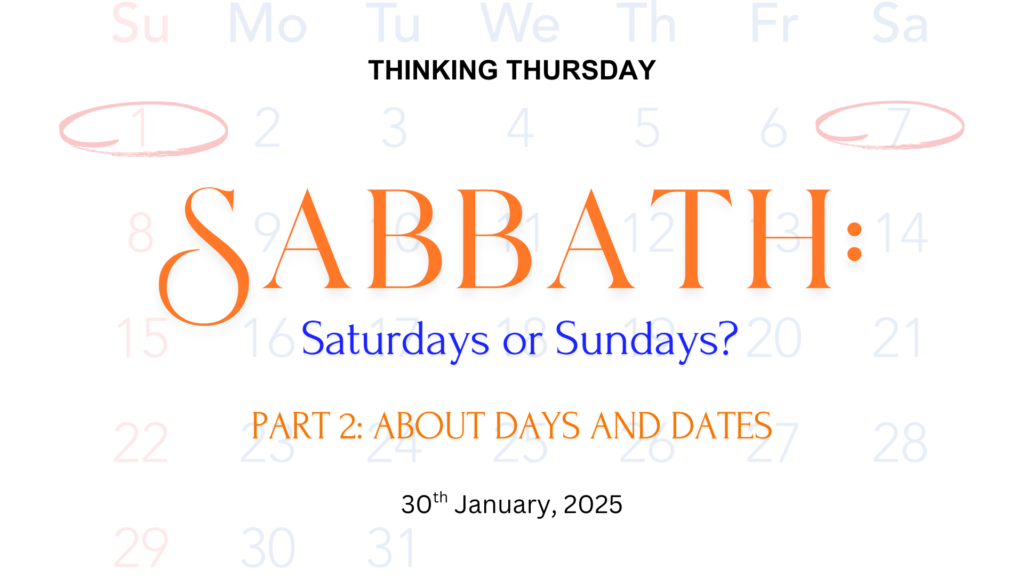ABOUT DAYS AND DATES
In the last part, we saw that the Sabbath has to do with ‘rest’. But is there more to the weekly rest? If we subscribe to one Sabbath, should we not abide by the others? Who determines which to continue and which to ignore? Do those who insist on the strict sabbath laws do so in all their prescriptions? Let me allow you to decide.
Based on the Jewish calendar, the weekly Sabbath falls on a Saturday. In Exodus 20:8-11, the Israelites are instructed to keep the seventh day holy. However, the truth is that Sabbaths are not just limited to the seventh day of the week. That’s why, in addition to the weekly Sabbaths, there are sabbaths every seventh week after the passover, every first day of the seventh month and every seventh year (the sabbath year), and every 49th year, i.e. seven times seven years (the Jubilee).
READ ALSO: DID YOU KNOW?
7th Day
“Six days of work may be done, but on the seventh day there must be a Sabbath of complete rest. It is a holy assembly; you must not do any work. It is a Sabbath to the Lord in all the places where you live.” (Leviticus 23:3)
7th Week
“‘You must count for yourselves seven weeks from the day after the Sabbath, from the day you bring the wave offering sheaf; they must be complete weeks. You must count fifty days — until the day after the seventh Sabbath — and then you must present a new grain offering to the LORD. (Leviticus 23:15-16)
7th Month
The LORD spoke to Moses: “Tell the Israelites, ‘In the seventh month, on the first day of the month, you must have a complete rest, a memorial announced by loud horn blasts, a holy assembly. You must not do any regular work, but you must present a gift to the LORD.'” (Leviticus 23:23-25)
READ ALSO: WHO’S THE JUDGE?
7th Year
The LORD spoke to Moses on Mount Sinai, saying, “Speak to the people of Israel and say to them, When you come into the land that I give you, the land shall keep a Sabbath to the LORD. For six years you shall sow your field, and for six years you shall prune your vineyard and gather in its fruits, but in the seventh year there shall be a Sabbath of solemn rest for the land, a Sabbath to the LORD. You shall not sow your field or prune your vineyard.
You shall not reap what grows of itself in your harvest, or gather the grapes of your undressed vine. It shall be a year of solemn rest for the land. The Sabbath of the land shall provide food for you, for yourself and for your male and female slaves and for your hired servant and the sojourner who lives with you, and for your cattle and for the wild animals that are in your land: all its yield shall be for food. (Lev 25:1-7)
7x7th Year
“You shall count seven weeks of years, seven times seven years, so that the time of the seven weeks of years shall give you forty-nine years…. And you shall consecrate the fiftieth year, and proclaim liberty throughout the land to all its inhabitants. It shall be a jubilee for you, when each of you shall return to his property and each of you shall return to his clan. That fiftieth year shall be a jubilee for you; in it you shall neither sow nor reap what grows of itself nor gather the grapes from the undressed vines. For it is a jubilee. It shall be holy to you. You may eat the produce of the field. (Lev 25:8-12)
READ NEXT: SABBATH: SATURDAYS OR SUNDAYS? (PART 3)
Impact?
The physical body of free men, servants, and animals, rested on the weekly sabbath days. The farmlands and indebted Jewish servants who were enslaved, for whatever reason, were set free during the sabbath year. Finally, the family land that was enslaved through sale arising from indebtedness, was set free on the Jubilee, the sabbath of the 50th year, and everyone could return to the original land that was distributed to all Israelites by Joshua/Yeshua/Ieusus/Jesus.
Watch: Marriage is a Missionary Field
